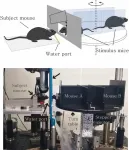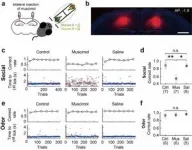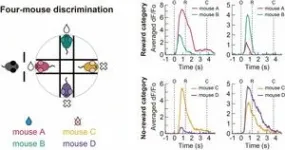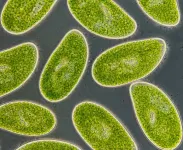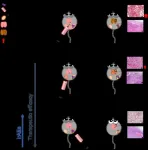(Press-News.org)
Researchers from the Center for Cognition and Sociality (CCS) within the Institute for Basic Science (IBS) recently announced the discovery of neurons that allow us to recognize others. The research team discovered that the neurons that deal with the information associated with different individuals are located in the CA1 region of the hippocampus.
Social animals, including humans, constantly engage in interactions with others. In this process, the ability to recognize the identity of the social counterpart, retrieve relevant information about them from memory, and update it from the current interaction is critical for establishing social relationships. However, there has been limited research on how these processes occur in the brain.
In order to answer this question, past efforts mostly focused on mouse brain studies, particularly in the hippocampus. The hippocampus was thought to be the answer, since it is a brain structure that is well-known to be responsible for memory formation. Within the hippocampus, the Cornu Ammonis (CA) fields, which are numbered CA1, to CA3, are involved in various functions related to memory and spatial processing and were hence key research interests.
So far, the mouse studies on the neural mechanisms of individual recognition mainly focused on the CA2 region of the hippocampus. However, previous studies have used behavioral experiments that only involve distinguishing unfamiliar mice from familiar mice, making it difficult to interpret whether the results reflect the animal’s ability to perceive or truly recognize individual characteristics.
In this study, the IBS-CCS research team developed a new behavioral paradigm using mice to better investigate their ability to recognize other individuals. Their new method involved having the subject mouse associate specific individual mice with rewards and studying their behavior after encountering reward-associated individuals and not associated individuals.
Specifically, two mice were immobilized on a spinning disk and were randomly presented to a subject mouse, which would recognize the neighbor through scent. Water is then supplied from the device to the subject mouse as a reward when licking in response to the reward-associated mouse, but not another. The researchers tried to determine whether the subject mouse could discriminate against different individuals and analyzed the brain cell activity during the experiment.
The stimulus mice on the spinning disk were male littermates and the subject mice were already familiar with the stimulus mice. This means that the subject mice distinguished between stimulus mice solely according to the unique characteristics of the stimulus mice, suggesting the high reliability of the experimental results.
Using this behavioral paradigm, the researchers clearly demonstrated that the dorsal CA1 region of the hippocampus plays an essential role in individual recognition. For example, when the hippocampal CA1 region is suppressed using a neuroinhibitor, the subject mouse was unable to distinguish its neighbor. Also by using a two-photon imaging technique that allows real-time observation of neural cell activity in the deep regions of the brain, the IBS-CCS team even identified the specific neuronal cells in the hippocampal CA1 region that is responsible for the recognition of individual mice.
This was an interesting addition to previous findings, which have proposed the dorsal CA2 region of the hippocampus to be the important brain area for social memory while reporting that the dorsal CA1 region does not play a significant role.
Furthermore, researchers in the past believed that social memories in rodents only last for a short period of time and that they do not form long-term memories about individual subjects. However, the latest study by the IBS-CCS has demonstrated that long-term memories about individuals can indeed be formed in mice.
Dr. LEE Doyun who led this research stated, “We have revealed for the first time how value information about others obtained through positive or negative interactions with them is represented and stored in our brains. Furthermore, this provides significant insights into understanding the role of our brains in building and developing human relationships through various social interactions.”
Beyond that, the researchers have also revealed the presence of specific neurons in the subject mouse’s hippocampal CA1 region that process positive information associated with different individual mice. An important part of forming a social relationship is assigning a positive or negative value to a social encounter with another individual and updating that value. For example, just as it is essential to develop a friendship with a particular individual, it is essential to evaluate how enjoyable and rewarding it was to interact with them.
These specific CA1 neurons were found to be responsive when encountering reward-associated individuals. However, such reward expectation responses were not observed when the subject was exposed to odors that are unrelated to social activity, such as citral or butanol. These findings indicate that the hippocampal CA1 region plays a selectively important role in the formation of associative social memories.
It is hoped that this new discovery can lead to a potential solution for the treatment of various brain disorders that cause difficulty in forming social relationships.
“Our results could be utilized to understand and propose treatment methods for mental disorders such as autism, which exhibit abnormalities in brain functions involved in processing memories and related information about others,” explains Dr. Lee.
END
DURHAM, N.C. -- Researchers studying a group of widespread but often overlooked microbes have identified a climate feedback loop that could accelerate climate change. But it’s not all bad news: this one comes with an early warning signal.
Using a computer simulation, a team of scientists from Duke University and the University of California, Santa Barbara, showed that most of the world’s ocean plankton and many other single-celled creatures in lakes, peatlands and other ecosystems could cross a threshold where instead of soaking up carbon dioxide, they start doing the opposite. That’s because of how warming affects their metabolism.
Because carbon dioxide ...
The chemical industry took a page out of the tobacco playbook when they discovered and suppressed their knowledge of health harms caused by exposure to PFAS (per- and polyfluoroalkyl substances), according to an analysis of previously secret industry documents by UC San Francisco (UCSF) researchers.
A new paper published May 31, 2023, in Annals of Global Health, examines documents from DuPont and 3M, the largest manufacturers of PFAS, and analyzes the tactics industry used to delay public awareness of PFAS toxicity and, in turn, delay regulations governing their use. PFAS are widely used chemicals in clothing, ...
While most aspects of care quality in long-term care homes did not differ in the first year of the pandemic from pre-pandemic levels, a new study shows that the use of antipsychotic drugs increased in all provinces.
The study analyzed health system performance reports provided by the Canadian Institute for Health Information (CIHI) over three years: two before the pandemic and the first year of COVID-19. The reports are based on more than half a million resident assessments completed in Ontario, Manitoba, Alberta and British Columbia.
Researchers ...
New research into Melburnians’ connection to nature is helping the City of Melbourne understand how to engage its community members in conservation efforts.
The study, led by RMIT University in collaboration with the City of Melbourne and Queensland University of Technology, surveyed over 1,500 City of Melbourne residents and visitors on their connection to nature and found nearly 75% of respondents had a high connection to nature.
More than 75% of respondents said they were concerned about climate change and the destruction of nature.
However, retirees and university students who have lived most of their lives in the Melbourne ...
Researchers using dashcam footage of real-world collisions involving large trucks to analyze driver and vehicle behavior has found that anti-drowsiness alarms or similar technologies to prevent falling asleep at the wheel need to go beyond a focus on monitoring the drivers’ eyes, and consider other microsleep behaviors including a relaxation of back and neck muscles and abnormal activity of the vehicle itself.
A study reporting the researchers’ findings was published April 13 in the ...
Scientists at Tohoku University have discovered a novel approach that improves the efficacy of immune checkpoint blockade (ICB) - a novel form of cancer treatment utilizing immune checkpoint inhibitors (ICIs) - and minimizes the associated side effects. They demonstrated that using ICIs to target tumor-positive lymph nodes generates a robust anti-tumor response against both local and systemic metastases.
The study was published in the Journal of Experimental and Clinical Cancer Research on June 1, 2023.
Our immune system uses “checkpoint proteins” to regulate and control the activity of immune cells. But cancer ...
Chemotherapy-induced peripheral neuropathy (CIPN) – nerve pain, tingling, or numbness in the hands or feet – is a common side effect of certain cancer treatments, including two drugs frequently used to treat cancer – the taxanes paclitaxel and docetaxel. Initial results from a large study that tracked CIPN in more than 1,100 patients treated for breast cancer with a taxane show a pattern of clinically meaningful, persistent sensory and motor symptoms, with patients experiencing more severe symptoms with paclitaxel than with docetaxel.
These initial results from the SWOG S1714 clinical trial are being reported in an oral presentation at the 2023 annual ...
WASHINGTON, D.C.—The U.S. Department of Energy (DOE) today announced $46 million in funding to eight companies advancing designs and research and development for fusion power plants, representing a major step in President Biden’s commitment to a pilot-scale demonstration of fusion within a decade. Fusion reactions power the stars, and research is underway to make fusion energy production on Earth possible, providing an abundant, inherently safe, non-carbon-emitting energy source for the planet. This funding from the Milestone-Based ...
Around 1 in 6 unvaccinated individuals say they are still experiencing health effects of covid-19 up to two years after infection, finds a study from Switzerland published by The BMJ today.
The findings show that 17% of participants did not return to normal health and 18% reported covid-19 related symptoms 24 months after initial infection.
Most people who have covid-19 recover soon after the initial phase of the disease, but others experience persistent health problems (known as long covid), which can impact quality of life ...
DALLAS and GENEVA, May 31, 2023 — Global efforts to improve emergency, critical and operative care for universal health coverage and protection from health emergencies were announced at the 76th World Health Assembly in Geneva, Switzerland. With the support of its partners the American Heart Association and the Laerdal Foundation, the World Health Organization (WHO), announced an initiative based on a new acute care resolution that was approved at this year’s World Health Assembly, the decision-making body of WHO.
Nearly 30 million deaths are due to emergency conditions each year, contributing to half of global deaths. The acute ...
